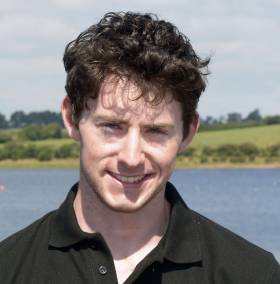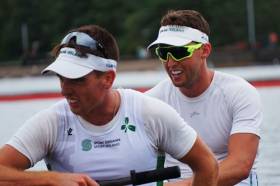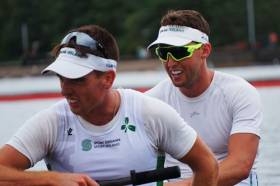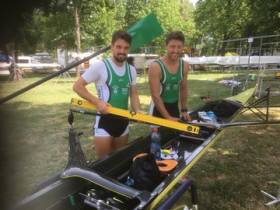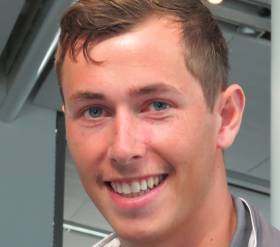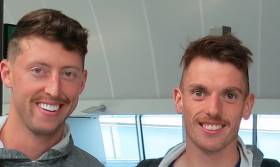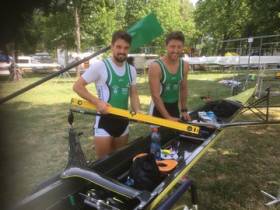Displaying items by tag: Shane O'Driscoll
Doyle and Byrne Impress but Disappointment for O'Donovan and O'Driscoll
#Rowing: Ireland’s Ronan Byrne and Philip Doyle produced a fine performance in their first competitive race together at the World Rowing Championships in Plovdiv, Bulgaria. The Ireland double were up against it in their heat, with just one crew going directly to the A/B Semi-Finals. New Zealand’s John Storey and Chris Harris made that theirs, using the fast conditions well. Italy and Ireland looked set to battle it out for second, but Doyle and Byrne opened up in the second half of the race and were well clear in second at the line.
Mark O’Donovan and Shane O’Driscoll finished a disappointing fifth in the men’s pairs heat and will have to compete in a repechage to make the quarter-finals. Canada were impressive winners from South Africa and France, with Ireland and Belarus vying for the crucial fourth place and direct qualification. Ireland had a slight advantage with 500 metres to go, but the Belarussians wrested back the lead and had almost a second to spare crossing the line.
The women’s pair of Aifric Keogh and Emily Hegarty qualified from their heat for the semi-finals, finishing second.
World Rowing Championships, Plovdiv, Bulgaria, Day One (Irish interest)
Men
Pair – Heat Four (First Four to Quarter-Finals; rest to Repechage): 1 Canada 6:20.46, 2 South Africa 6:21.85, 3 France 6:25.43, 4 Belarus 6:28.22; 5 Ireland (M O’Donovan, S O’Driscoll) 6:29.10
Double Sculls – Heat One (Winner to A/B Semi-Final; rest to Repechages): 1 New Zealand 6:02.23; 2 Ireland (P Doyle, R Byrne) 6:12.61
Women
Pair – Heat One (First Three to A/B Semi-Final; rest to Repechage): 1 New Zealand 6:56.06, 2 Ireland (A Keogh, E Hegarty) 7:11.51, 3 United States 7:13.02.
#Rowing: Shane O’Driscoll and Mark O’Donovan took fifth in their B Final of the pairs, 11th overall, at the European Championships in Strathclyde Park in Scotland. In overcast but calm conditions, Ireland started well, but Germany took over and held the lead to 1500 metres. By then they were already under real pressure from Ollie Cook and Matt Rossiter from Britain, who took over and won. O’Driscoll won a battle with Ukraine at the back of the field but while they had the fastest final 500 metres they could not get past the Netherlands or Russia, who finished fourth and third. Germany were second.
European Championships, Day Three, Strathclyde, Scotland (Irish interest)
Men
Pair – B Final (Places 7 to 12): Britain 6:36.77; 5 Ireland (M O’Donovan, S O’Driscoll) 6:44.58.
#Rowing: Mark O’Donovan and Shane O’Driscoll finished a close-up fifth in their semi-final of the pairs at the European Rowing Championships in Strathclyde, Scotland. France were the dominant force and took the first of the three qualification places. Italy were the most consistent challengers. Ireland held sixth and fifth through the middle of the race, but all the crews were in the hunt for the second and third places in the final quarter. Belarus drove into second; Italy took third. O’Donovan and O’Driscoll came with a sprint and almost caught the Netherlands, who took fourth.
European Rowing Championships, Strathclyde, Scotland – Day Two (Irish interest)
Men
Pair – Semi-Final Two (First Three to A Final; rest to B Final): 1 France 6:26.94, 2 Belarus 6:29.06, 3 Italy 6:29.46; 5 Ireland (M O’Donovan, S O’Driscoll) 6:31.47
Women
Lightweight Double Sculls – Repechage One (First Two to A Final; rest to B Final): 1 Switzerland 7:03.89, 2 Britain 7:06.04; 3 Ireland (A Casey, D Walsh) 7:11.31.
#Rowing: Mark O’Donovan and Shane O’Driscoll produced a remarkable final 500 metres to move from fourth to second in their repechage and qualify for the A/B semi-finals of the men’s pair at the European Rowing Championships in Strathclyde in Scotland.
Three crews qualified from this race, and the Skibbereen men were a second off Austria as the crews entered the final quarter. Serbia and Ukraine held the top two spots. But then O’Driscoll and O’Donovan wound up to stroke rates high in the 40s and swept past Austria and the Ukraine.
European Rowing Championships, Strathclyde, Scotland (Day One, Irish interest)
Men
Pair – Heat Three (First Two to A/B Semi-Finals, rest to Repechage): 1 Belarus 6:37.38, 2 Britain 6:37.76; 4 Ireland (M O’Donovan, S O’Driscoll) 6:48.94. Repechage One (First Three to A/B Semi-Finals; rest to C Final): 1 Serbia 6:33.77, 2 Ireland 6:35.74, 3 Ukraine 6:36.11.
Lightweight Double Sculls – Heat Three (First Two to A/B Semi-Finals; rest to Repechage): 1 Ireland (G O’Donovan, P O’Donovan) 6:27.99, 2 France 6:29.83.
Women
Lightweight Double Sculls – Heat One (Winner to A Final; rest to Repechage): 1 Poland 7:08.54; 4 Ireland (A Casey, D Walsh) 7:22.02.
O'Driscoll and O'Donovan Race in European Rowing Heat
#Rowing: Ireland’s Shane O’Driscoll and Mark O’Donovan finished fourth in their heat of the pair on the opening day of the European Championships in Strathclyde, Glasgow. Just two crews go through to the A/B semi-finals, and Ireland face into a repechage.
The race was well jugdged by Matthew Rossiter and Oliver Cook of Britain. They held a place behind leaders Belarus and the Netherlands until the final quarter, then elbowed their way into second. The Netherlands cracked and finished third.
O’Driscoll and O’Donovan rowed well, but were not part of the final charge for qualification places and eased off with an eye on the repechage.
European Rowing Championships, Strathclyde, Scotland (Day One, Irish interest)
Men
Pair – Heat Three (First Two to A/B Semi-Finals, rest to Repechage): 1 Belarus 6:37.38, 2 Britain 6:37.76; 4 Ireland (M O’Donovan, S O’Driscoll) 6:48.94.
#Rowing: Three of the four Ireland boats in early action at the World Cup Regatta in Lucerne qualified directly from their heats and avoided repechage action.
Shane O’Driscoll and Mark O’Donovan took second place in their heat of the men’s pairs and secured a place in the quarter-finals. The world lightweight champions came up against the outstanding Sinkovic brothers from Croatia, who won the race with a sparkling performance. The key battle behind them was not to finish last. Brazil and Australia battled with Ireland, but O’Donovan and O’Driscoll moved away from both, collared second place and held on to it.
Patrick Boomer and Andy Harrington secured third place in their heat. Their qualification looked in doubt as they battled with Croatia at the back of the field. But the big Ireland crew found speed when they needed it. They produced the fastest final quarter, and left the Croats behind them. China faded badly and took the last place.
The women’s double of Monika Dukarska and Aileen Crowley qualified directly for the A/B Semi-Finals with a solid second place. The United States crew of Megan O’Leary and Ellen Tomek were convincing winners, while Dukarska and Crowley held on to second despite a late charge by China, who pushed Switzerland into the repechage.
In the women’s pair, the new crew of Aifric Keogh and Tara Hanlon finished sixth in their heat and are set for a repechage.
World Cup Regatta, Lucerne, Day One (Irish interest; selected results)
Men
Pair – Heat Two (First Four to Quarter-Final; rest to Quarter-Final or E Final): 1 Spain 6:40.29; 3 Ireland Two (P Boomer, P Harrington) 6:45.74
Heat Six (First Three to Quarter-Final; rest to Quarter-Final or E Final): 1 Croatia 6:37.66, 2 Ireland One (M O’Donovan, S O’Driscoll) 6:40.95.
Women
Pair – Heat Two (First to A Final; rest to Repechage): 1 Canada 7:13.98; 6 Ireland (A Keogh, T Hanlon) 7:32.49.
Double Sculls – Heat Two (First Three to A/B Semi-Finals; rest to Repechages): 1 United States 6:58.58, 2 Ireland (A Crowley, M Dukarska) 7:03.05.
#Rowing: Mark O’Donovan and Shane O’Driscoll took third place in their C Final of the men’s pair at the World Cup in Belgrade this morning. This was an extraordinary race. Britain Two, South Africa, Ireland and Greece moved as a pack through halfway and the 1500 metres. Greece then took over in the lead, with Ireland also contending. But Hungary, which had hung in sixth and fifth place through most of the 2,000 metres, finished best. They passed the leaders and won, with Greece and Ireland next over the line.
The placing put O’Donovan and O’Driscoll 15th of the 22 crews which raced.
World Cup Regatta, Belgrade, Day Two (Irish interest)
Men
Pair – C Final (Places 13 to 18): 1 Hungary 6:55.35, 2 Greece 6:57.73, 3 Ireland (M O’Donovan, S O’Driscoll) 6:59.0, 4 South Africa 7:00.22.
#Rowing: Mark O’Donovan and Shane O’Driscoll finished third in their repechage and qualified for the C Final of the men’s pair at the World Cup regatta in Belgrade. The first two boats over the line qualified for A/B Semi-Finals, and the Netherlands One, which won well, and Netherlands Two took these spots. O’Donovan and O’Driscoll pushed hard to break into the top two, with a very high rate of striking, but even though they did not do this, their fast finish helped them win a battle with South Africa to take third and secure a place in the C Final (places 13 to 18).
World Cup Regatta, Belgrade (Irish interest)
Men
Pair – Heat Four (Winner to A/B Semi-Finals; rest to repechage): 1 Czech Republic 6:41.22; 2 Spain 6:48.03, 3 China One 6:51.79, 4 Ireland (M O’Donovan, S O’Driscoll) 6:51.91. Repechage Three (First Two to A/B Semi-Finals; third to C Final; rest to C or D Final): 1 Netherlands One 6:48.68, 2 Netherlands Two 6:50.07; 3 Ireland 6:51.82.
Lightweight Double Sculls – Heat Three (First two to A/B Semi-Finals; rest to repechage): 1 Canada Two 6:32.69, 2 Ireland (G O’Donovan, P O’Donovan) 6:34.29.
Women
Pair – Heat One (First Three to A/B Semi-Finals; rest to repechage): 1 Britain One 7:19.05, 2 Britain Two 7:22.92, 3 Ireland (A Keogh, E Hegarty) 7:23.77.
Double Sculls – Heat Three (First Three to A/B Semi-Finals; rest to repechage): 1 Netherlands 7:10.90, 2 China One 7:16.89, 3 Ireland (A Crowley, M Dukarska) 7:20.40.
Lightweight Double Sculls – Heat One (First two to A/B Semi-Finals; rest to repechage): 1 Britain One 7:26.96, 2 United States One 7:28.40; 5 Ireland (M Cremen, D Walsh) 7:50.34.
Single Sculls – Heat One (First Two to A/B Semi-Finals; rest to repechage): 1 Ireland (S Puspure) 7:50.48, 2 Ukraine (D Dymchenko) 7:59.30.
#Rowing: Mark O’Donovan and Shane O’Driscoll took fourth in their heat of the pair at the World Cup Regatta in Belgrade this morning. Only the winner nailed down a place in the semi-final and the Czech Republic took this after a battle with Spain. Well behind them, China One won their battle with O’Donovan and O’Driscoll.
The Irish, the world champions in the lightweight pair, are hoping to establish themselves as a heavyweight pair. They were 13th of the 22 contenders on time.
World Cup Regatta, Belgrade (Irish interest)
Men
Pair – Heat Four (Winner to A/B Semi-Finals; rest to repechage):
1 Czech Republic 6:41.22; 2 Spain 6:48.03, 3 China One 6:51.79, 4 Ireland (M O’Donovan, S O’Driscoll) 6:51.91.
Women
Pair – Heat One (First Three to A/B Semi-Finals; rest to repechage): 1 Britain One 7:19.05, 2 Britain Two 7:22.92, 3 Ireland (A Keogh, E Hegarty) 7:23.77.
O'Donovans Burn Off Rivals at Ireland Rowing Trials
#Rowing: Paul O’Donovan and Gary O’Donovan produced the best performance of the first Saturday session of the Ireland trials. The lightweight double beat their Skibbereen under-23 rivals Jake and Fintan McCarthy by 8.4 seconds and a heavyweight double of Ronan Byrne (UCC) and Philip Doyle (Queen’s) by 3.9 seconds.
The heavyweight pair of Shane O’Driscoll and Mark O’Donovan also put their challengers firmly behind them. They raced at a high rate in the good conditions and beat Patrick Boomer and Andy Harrington by 6.6 seconds.
Three senior women’s crews performed well. Single sculler Sanita Puspure and the heavyweight and lightweight doubles of Monika Dukarska and Aileen Crowley and Denise Walsh and Margaret Cremen all looked on form as the selectors decide on which crews to send to the World Cup Regatta in Belgrade.
In the junior trials, Annie O’Donoghue and Ciara Moynihan of Workmen’s won a fine doubles race. Aoibhinn Keating of Skibbereen and Ciara Browne of Workmen’s were their closest rivals, but Mollie Curry of Coleraine GS and Eimear Crowley of Kenmare contended at the finish and were just 1.4 seconds off the winners.


























